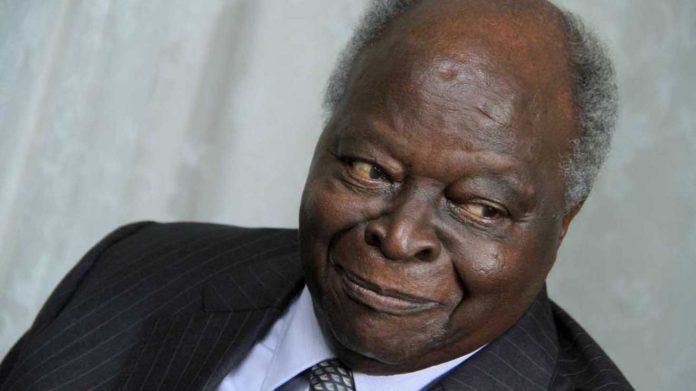
His 2002 election ended 40 years of one-party rule since independence.
However, his 2007 re-election sparked months of nationwide violence and led to 1,200 deaths.
President Kenyatta, defeated by Mr Kibaki in 2002, led the tribute to his former rival, saying he had “led the charge to keep the ruling party accountable”.
Mr Kibaki had “earned the abiding respect and affection” of this nation, the president continued.
Mr Kenyatta declared a mourning period until Mr Kibaki’s burial, with flags flying at half-mast. He will be given a state funeral with full military honours, President Kenyatta said.
Mwai Kibaki ‘earned abiding respect and affection’
Many Kenyans are expressing a real sense of loss and regard Mr Kibaki as the best president Kenya has had since independence.
He was a sharp economist who set the country on a path of economic growth. He held a number of senior positions in treasury and government in his political career that spanned decades.
Politically, however, he was regarded as a non-confrontational fence-sitter and opportunist. He opposed the introduction of multiparty democracy but jumped ship after the constitution was amended. He then embraced it, formed his own political party and, 10 years later, went on to win the election as head of an opposition coalition.
Both traits would be seen during his tenure as president. Kenya recorded one of its highest rates of GDP growth during his first term, before the violence of the 2007 election severely dented his legacy.
As well as his economic record, one of his biggest achievements was to introduce free primary education to Kenya.
Under his watch, Kenya also gained a new constitution, after it was overwhelmingly approved in a national referendum in 2010. It was billed by some at the time as the most important political event in Kenya’s history since it gained independence from Britain in 1963.
It introduced a more decentralised political system and limited presidential powers.
His biggest failure was the fight against corruption. He’d promised to fight it, but his government was rocked by major corruption scandals.
But the 2007-2008 election violence after a disputed vote was the worst in the country’s history and the lowest point of his presidency. Not only were more than 1,200 lives lost, but more than half a million people were forced from their homes.
During the violence there were hundreds of rapes and more than 100,000 properties were destroyed, according to the International Criminal Court (ICC). It charged leading politicians with orchestrating the violence but neither Mr Kibaki nor opposition leader Raila Odinga was among them.
The electoral commission, under tight police security, declared Mr. Kibaki the winner of the vote, although Mr Odinga alleged widespread fraud. President Kibaki was sworn in hurriedly for the second term as the country descended into viol





















